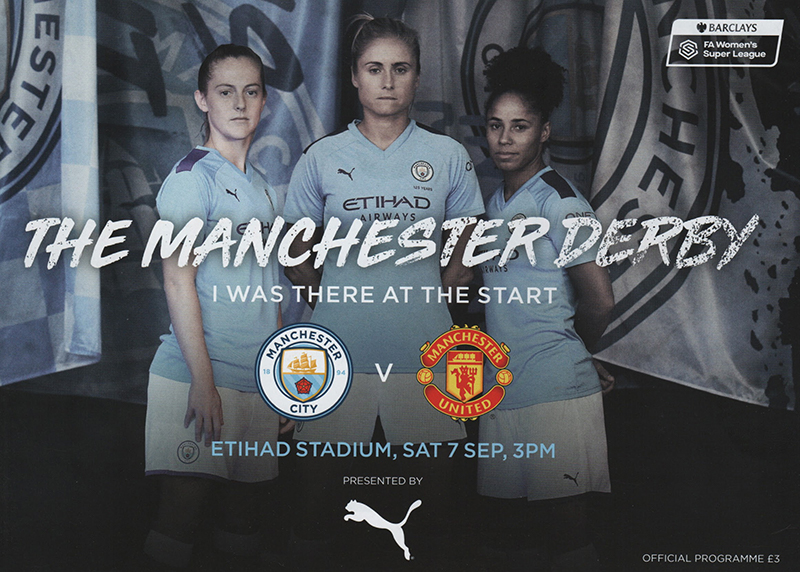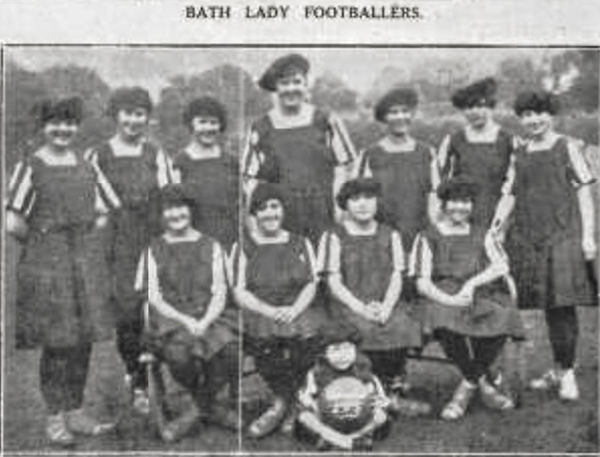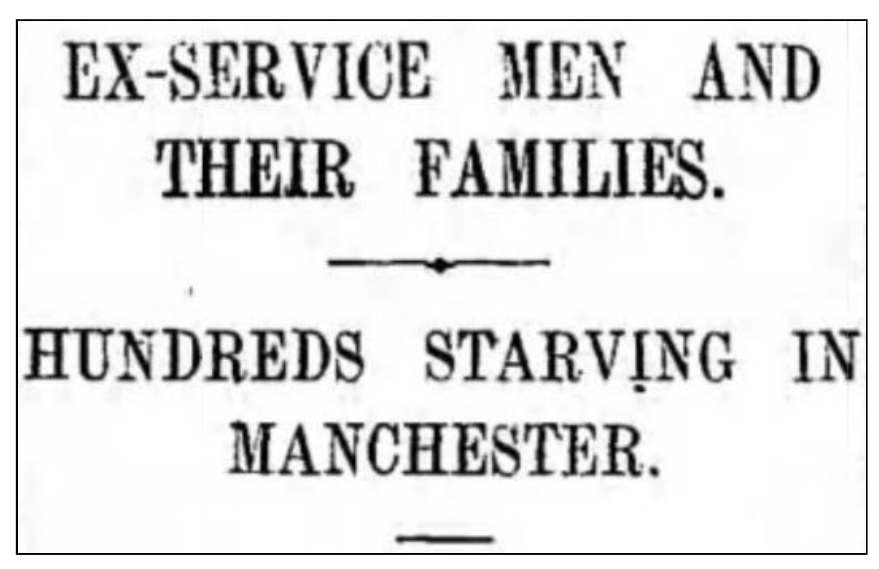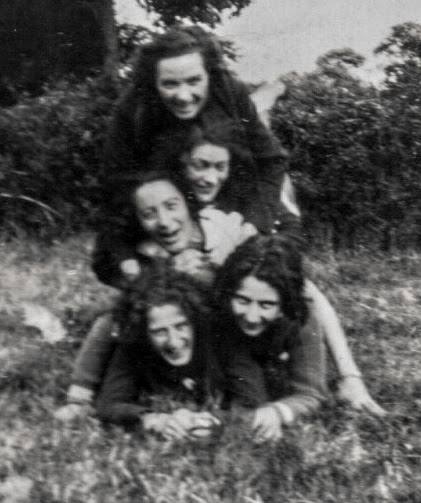The Football Game That Makes Me Cry
03/07/2020 - 4.12
Steve Bolton
“An ex-soldier, his wife, and three children were found in a room, the only furniture consisting of a mattress for them to lie on. They were in a state of starvation. This is an educated man willing to take on any sort of work” (Manchester Guardian – Monday, 31st January 1921)
(NB. Some of the photos in this blog are scanned from originals that are dated and worn, hence the blur and pixelation)

Manchester City vs Manchester United at the Etihad 2019 (Source: Author’s Collection)
Women’s Football Superstars
Saturday, 7th September 2019, found an excited dad and his two teenage sons (not excited and not interested) on his way to see the legends of the game, at a beautiful Stadium in front of a 30,000 plus crowd. Back in the 1921 ‘golden year’ of women’s football, my granny’s team St Helens, had been watched by a quarter of a million spectators: 27 games at an average of approximately 10,000. Even then, there weren’t many games at 30,000 or over and there have been precious few in the intervening century since the FA ban. We had a hotel which quite by chance was at the other end of ‘curry mile’ and as well as the football, the boys had to listen to me reminisce about visiting my mates at University and eating awesome curries without utensils. Even having a pint, I sat below a beautiful print of the long lost Fallowfield Stadium where many magnificent women’s football matches had taken place over the years. The game was fun (bit of a neutral!) and I managed to get my programme signed by the Jill Scott and the Ellen White - woohoo!

Bath Ladies FC -Guess which player had the nickname ‘Tiny’? (Source: British Newspaper Archive)
When I first read that the game in Manchester was to have an ‘incredible’ attendance of 30,000 plus, I remembered that Manchester had previously hosted a game with a reputed attendance of 31,000. This game was played on Saturday, 8th January 1921 and the Dick Kerr Ladies beat the Bath Ladies by 12 goals to nil. The game was played at Old Trafford, so first bragging rights to the red half of Manchester/The Globe. In one sense, this game was just one of many, many thrashings inflicted by the superstar Dick Kerr Ladies in 1921. However, I had also researched the Bath Ladies and there is a bit more to that game. Bath Ladies had been trying for months to get a game against the Dick Kerr Ladies and were delighted even to have been beaten so heavily. They tried very hard to get a return game but Alfred Frankland wanted a couple of high profile games at Bristol City’s stadium to make the trip worthwhile and it didn’t happen. They raised £2,000 for the Unemployed Ex-Servicemen’s Fund in Manchester which was a vast amount of money in those days.

Manchester Guardian – Monday, 31st January 1921 (Source: Newspapers.com)
The headline above is the one which ‘grabbed me by the throat’ and still does. In all my thousands of hours of women’s football research nothing has brought home to me the horror of what was faced by those brave men, women and children after the war and the direct role those magnificent women footballers had in literally saving lives. I am actually finding this quite difficult to write. The article goes on to say that 8,000 applications had been made for food parcels and that it had only been possible to grant relief to the 700 families who were actually starving. This is over two years after the end of the war and in one of our major cities.
“It will be remembered that when the men were in the trenches the public of Manchester and Salford came forward and sent them out parcels of food. We would suggest that these men are fighting a worse enemy - namely, starvation…”
“…An ex-service man’s wife was confined on Christmas Day, and gave birth to twins. This man is without any pension or unemployment pay, and both woman and children were practically dying through lack of nourishment.”
Manchester Guardian – Monday, 31st January 1921 (Source: Newspapers.com)

Lizzy Ashcroft, individual’s name yet to be confirmed, Andree Gauckler, Margaret Thornborough and Lily Parr. Dick Kerr Legends still raising money in the 1930s (Source: Author’s Collection)
I know quite a bit about the history of women’s football. I have of course been aware that the great majority of the games pre-World War Two were to raise money for good causes. This in many ways has been an intellectual exercise with the occasional deeper, emotional tug from an article. However, rarely I have been so viscerally connected to the outcome of one particular game and this next sentence really brought it home. “The very small amount of money that was raised by the football match is practically exhausted, and the Committee are quite powerless to render any further help unless the public will come to their assistance” (Manchester Guardian – Monday, 31st January 1921). This takes the issue from head to heart. I read this article several months ago and it shocked me like no other article. Hopefully, it made me think and appreciate what I have. This link of one football game to starving babies on the streets of Manchester sheds a new light for me on the role of my granny and those magnificent women. Athletes, footballers, strong independent women and life-savers. It makes me so proud of my relative.
It was only 10 months later that they would be banned from using magnificent stadia like Old Trafford.
Biography

Steve Bolton was awarded a BSc (Hons) in Mathematics from University College London and a Post Graduate Certificate in Education from the University of Nottingham. Steve’s passion is researching and writing about the history of women’s football. He has had several articles published and is currently working on h first book: “Granny Played Football”. Granny Lizzy Ashcroft was one of the most influential and important pre-World War Two women’s footballers. She made her debut at the age of 16, for St Helens Ladies at St Andrews in April 1921, in front of a crowd of 30,000. After the English FA ban she joined the Dick Kerr Ladies in 1923 where she played until her retirement in 1935. She was vice-Captain under Lily Parr from 1932-1934 and in 1935 took over the Captaincy from her great mate Lily and led the DKL on only their second ever continental tour. Steve is custodian of the Bolton Family Archive which is one of the foremost collections of pre-World War Two women’s football memorabilia in private hands.
Steve’s Twitter handle is: @STEPHEN11981196 and he can be contacted by email at: lizzyashcroftfootballer@gmail.com


/prod01/wlvacuk/media/departments/digital-content-and-communications/images-2024/240328-Varsity-Line-Up-Resized.jpg)
/prod01/wlvacuk/media/departments/digital-content-and-communications/images-18-19/220325-Engineers_teach_thumbail.jpg)
/prod01/wlvacuk/media/departments/digital-content-and-communications/images-2024/240515-Spencer-Jones-Award-Resized.jpg)
/prod01/wlvacuk/media/departments/digital-content-and-communications/images-2024/240320-Uzbekistan-Resized.jpg)
/prod01/wlvacuk/media/departments/digital-content-and-communications/images-2024/240229-The-Link-Resized.jpg)
/prod01/wlvacuk/media/departments/digital-content-and-communications/images-2024/240516-Andy-Gibson-Resized.jpg)